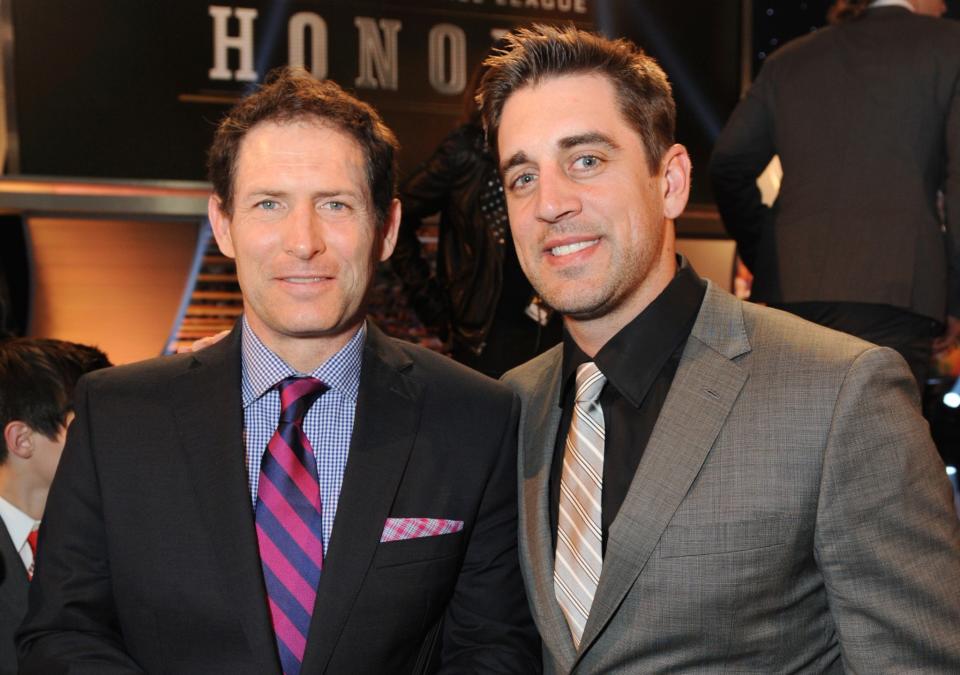Aaron Rodgers and Steve Young have some remarkable similarities, career-wise
It’s tough to compare the career of Steve Young to any other quarterback considering the odd path he took. From the USFL to under-fire Tampa Bay Buccaneers starter to Joe Montana’s backup to Super Bowl winner whose best years were in his mid-30s, Young pretty much took a unique road to the Pro Football Hall of Fame.
So it’s striking to look at the career totals of Young vs. another player who will end up in Canton one day. Through three weeks, Aaron Rodgers is off to a good start — despite everyone wondering what was wrong with him after a tough game against maybe the best defense in football.

Thanks to the terrific statistical tools of Pro Football Reference, we can put the career totals of Young and Rodgers side by side and note some stunning similarities — even accounting for the different eras in which they played.

It’s hard not to notice the near mirror-image stats: the completions, attempts, yards are nearly identical (which of course makes the completion percentage and yards per attempt similar, too). A coincidence? Perhaps. Young left the game in 1999, still a run-heavy era. Rodgers came into the NFL in 2005, right when passing games were flourishing like they seldom had before. But there still are some interesting parallels in their careers worth noting.
Perhaps it’s more impressive that Young didn’t start his 40th NFL game until 1992 — at age 31, in his eighth NFL season (and ninth in professional football). Rodgers hit that mark midway through his third season of starting, and sixth year into his career.
So it’s natural to wonder what either of them would have been like had they started earlier in their careers. Both sat behind Hall of Famers. Young struggled with the Bucs and might never have been who he became without Bill Walsh’s teaching and system, and not every QB gets to throw to Jerry Rice and Terrell Owens. Rodgers freely admits he was not ready his first season, and perhaps not his second. But Mike McCarthy was very good for his development — up to a certain point.

There is no straight line between Young and Rodgers, which is clear via the big gaps in interceptions (Young’s 107 to Rodgers’ 66) and TD passes (264 to 232). So Rodgers is better? Maybe — as a pure thrower. Factor in the rushing numbers, and it tilts the story a bit.
Young ran 722 times in his career for 4,239 yards and 43 touchdowns. Rodgers is a quality runner in his own right, but his 446 rushes and 2,242 yards and 23 TD runs pale in comparison. Add up their TD passes and runs combined, and Young’s 275 trails only Rodgers’ 287 by a dozen.
There’s also playoffs to consider. Young played in 22 postseason games, but the first eight of those were in relief, which added up to less than one game’s worth of production. Factor in the January 1997 game in which Young tried to gut through broken ribs but couldn’t go very long, and he and Rodgers have had very comparable career playoff reps.

Their numbers are similar here, too. Again, completions, attempts and passing yards — oddly close. Rodgers has the better INT rate; Young the better rushing totals. And, of course, their Super Bowl win totals are equal: one apiece.
Young and Rodgers are each top 10 all-time great quarterbacks, though others might disagree. (Which is amazing considering that Montana and Brett Favre, the men who kept them from seeing the field earlier, most certainly are.) Still, Rodgers is a mere three games into his age-32 season, turning 33 in Week 14 and likely looking at five quality seasons or more barring a career-altering injury.
The next few seasons will separate Rodgers statistically from Young, and maybe by a healthy margin when it’s all said and done. But will he win another Super Bowl? Until there’s a stark difference in their numbers, that might be the biggest thing that can push Rodgers ahead in the all-time QB pantheon.
More NFL on Yahoo Sports
– – – – – – –
Eric Edholm is a writer for Shutdown Corner on Yahoo Sports. Have a tip? Email him at edholm@yahoo-inc.com or follow him on Twitter!

 Yahoo Nachrichten
Yahoo Nachrichten 

